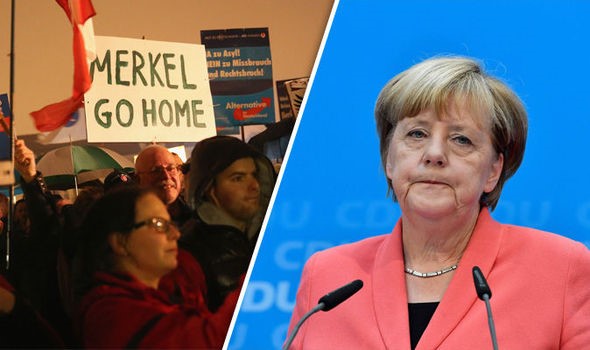The German general election last month saw fascists entering the German Parliament for the first time since the end of the Second World War. But there was also an increased vote for Die Linke, including the re-election of International Socialists into parliament from the Left Party (i.e. Die Linke).
The Christian Democrats’ (CDU) result shows deep discontent with Angela Merkel’s free market reforms and attacks on working-class people. However, she still won her fourth election, a third of the vote and will govern for another four years in coalition with the Greens and liberal democrats.
The SPD won only 21 percent of the vote, its worst result since 1945. This was a humiliating defeat for its leader Martin Schulz who had hoped to be able to replace Merkel in the run-up to the election. This contrasts with the left-wing leader of the Labour Party in Britain who is gaining public support and consolidating his leadership base at the recent party conference.
Merkel’s largest parliamentary opposition (aside the SPD), however, is no longer the left-wing Die Linke, but rather the far-right Alternative for Germany (Alternative für Deutschland, or AfD). This is a coalition of ex-CDU members, hard right nationalists, racists and fascists. The fascist wing has grown in the last year.
The AfD won nearly 13 per cent of the vote, the first time a far-right party has won parliamentary seats in Germany since the Second World War (parties need more than five per cent to get members of parliament). It now has 93 members of parliament. This follows a trend of rising support for the right wing across Europe and the election of president Trump in the US.
The German economic boom has been based on forcing down wages leading to greater inequality and areas of poverty and deindustrialisation. The AfD’s best results were in places which have failed to benefit from Germany’s current neoliberal boom, such as the deindustrialized east, and among groups of the traditional working class who feel threatened by downward mobility.
Thousands of people took to the streets in response to the AfD’s election breakthrough. Some 3,000 anti-racists protested outside the AfD’s election party in Berlin. Chants of “Racism is not an alternative,” “AfD is a bunch of racists,” and “Nazis out!” rang out in the square. Security guards were forced to move AfD supporters from the balcony of the building after protesters hurled objects at them. Police secured the area, but people kept streaming into the square.
Lisa, one of the protesters, spoke to a local newspaper. “Especially in times like these, I think it is important that we speak up against racism and xenophobia and the AfD’s right wing ideology,” she said.
The AfD also pulls the mainstream parties to the right. Merkel promised to listen to the “concerns and anxieties” of AfD voters to win back their votes.
The left wing Die Linke party’s vote rose by around 1 percent to about 9 percent. But it has not fully capitalised on the disaffection with Merkel or the SPD. Christine Buchholz, an International Socialist and a Die Linke member of parliament, said, “The entry of the AfD into parliament is bitter. For the first time in decades, Nazis are in the Bundestag.”
Die Linke has put itself at the head of struggles against austerity and racism—and the AfD. But in Berlin, Brandenburg and Thuringia, in the poorer former East Germany, the party has been part of regional governments that voted for privatisation. This blunted putting forward a radical alternative to Merkel and the AfD.
The German elections follow recent trends in Europe and the US. The vote for the traditional main stream parties is declining and support is growing for a left-wing alternative to austerity and inequality. However, there is also the growing threat of right-wing nationalists and populists. This includes the AfD in Germany, the National Front in France, Austria (where a fascist was almost elected head of state last year and the full face Islamic veil was recently banned in public) and Trump with his extreme right wing and fascist supporters in the US.
by Drew Povey









